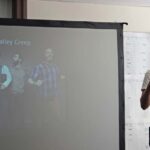At Design Week Portland, issues of data privacy and smart cities surface.
Ninety percent of the data generated in the world to date was created in the past two years.
As tech giants like Facebook, Google, Uber and Lyft collect and monetize more data every day from our phones, laptops and even our homes, it’s clear that businesses need to do more to quell consumer privacy concerns.
It is Design Week Portland and at a panel on technology and liveability in cities, business leaders and public officials approached our data-driven future with cautious optimism. The event was billed as an exploration of the technology driving smart cities, but the conversation turned mostly to the ethics of collecting and storing large volumes of consumer data, one of the thorniest issues of the digital age.
Keeping information about your daily habits personal has become an impossible proposition. A large number of multi-family housing developers are adding smart-home features to their apartments, said Sce Pike, one of the panelists, and a founder of smart-home company IOTAS. Internet-connected devices in these dwellings know when you’re out of coffee filters, when you’re away from home and when you need milk.
IHS Markit forecast the smart-home industry growing at an impressive compound annual growth rate of 44% between 2016 and 2021.
Along with smart homes, cities are prepping for the widespread adoption of autonomous vehicles. These inventions will add to the millions of data points already collected from our web searches and GPS-enabled devices.
“How much do we want our environment to know about us?”
Smart-city technologies hold promise for a more comfortable and efficient future, the speakers said, but only if companies take greater care with their customers’ personal information.
Two of the panelists said they’ve sworn off Facebook, mostly for data privacy concerns. They gave tips to an audience member who asked how to protect her data stored on devices at work, and repeatedly cited a New York Times investigation about how smartphone location data can be used to track a person’s movements.
“People are realizing the control that needs to be taken over that data and what it is used for,” says Connie Hotovec, a project architect at Gensler.
Eliot Rose, a technology strategist at Metro, the Portland area’s regional government, explained how public agencies are drawing upon data to plan more efficient transportation and reduce crashes throughout the region. In East Portland, Current by GE CityIQ sensors attached to light poles collect information about how people travel.
The pilot project demonstrates a cutting-edge technology for smart cities, but also invites data privacy questions from the public. The American Civil Liberties Union decried similar CityIQ sensors in San Diego as “a web of surveillance technology.” In Portland, Rose says, members of the public have also expressed concern about data collection at public meetings.
“They don’t know how to hold Google accountable, so they’re coming to public agencies,” Rose says.
“People are realizing the control that needs to be taken over that data and what it is used for,” says Connie Hotovec, a project architect at Gensler.
Companies can make consumers more comfortable by giving them ownership over their data, says Pike. Our data sits within numerous computers, phones and servers, making it difficult to know who can access it. IOTAS gives its customers a “living profile” — their preferences and personal information are stored in the cloud. When they move apartments, they take their profile with them.
Pike says people who know their data are stored in a single cloud-based repository might feel like they have more control over the information.
As connected Internet of Things devices cater to more of our needs, another speaker, Wilf Pinfold of startup urban.systems, tells the audience the essential question becomes, “How much do we want our environment to know about us?”
To subscribe to Oregon Business, click here.







